The FC A hasn’t got a ****ing Scooby. The Federation of Consolidated Apathy has now proved way beyond reasonable doubt that it is clueless about pensions in general. And worse – much worse – that it doesn’t understand the deadly problems with DB pension transfer advice.

The Federation of Consolidated Apathy has published a video which deliberately misleads people into thinking that advisers will provide DB transfer advice which is in the victims’ interests.
This incredibly boring video seems to have been produced by some clot called Mark Goold who claims to work for the “Communications Division” of the FC A. He clearly has no understanding of communications since he has made a video that is so incredibly monotonous and dreary that it is impossible to watch – and even harder to believe. Either Goold knows nothing about ten years’ worth of DB pension transfer scams – or he is deliberately ignoring it.

Goold the goon says he “wants to talk about our expectations of financial advisers when they provide pension transfer advice”. A noble aim – just a shame he did no research before opening his mouth (and putting his foot in it). If he’d had even half a brain, he would have consulted the British Steelworkers before making such an utter fool of himself. Equally, he could have consulted a few of the thousands of victims of DB scheme members who have been scammed over the last few years because of FCA-regulated transfer sign-offs.
The one thing that Goold says that is true and accurate is “it will generally not be in a client’s best interests to leave a pension scheme that will provide them with a guaranteed and sustainable income when they retire”.
But he does not say what action the FCA is proposing to take against the negligent – and, in some cases, fraudulent – FCA-regulated advisers who have been signing off such transfers for so many years. These firms have facilitated widespread financial crime and this has led to the destruction of millions of pounds’ worth of pensions. But the nits at the FCA are far too busy knitting to take any action against these firms.

The FCA goon goes on to spout: “we would expect advisers should follow certain steps, ask certain questions and provide specific documentation when reviewing your personal situation and recommending something to you”. He then goes on to list a number of “steps” that should “generally be carried out” by advisers. But he forgets to mention that the unethical FCA-regulated transfer advisers will deliberately omit these steps. These rogue advisers may be relatively rare, but they will – between them – feed the majority of the scammers in the UK and offshore.
Of course, the subject of “contingent” charging has not reared its ugly head. The Federation of Consolidated Apathy is obviously expecting advisers to make a choice:
- Advise to transfer and earn a fee or
- Advise not to transfer and earn nothing
I expect ethical advisers will easily walk away empty handed – happy that they’ve done the right thing (and prevented a transfer to criminals). But that’s a bit like expecting that a regulator will do a bit of regulating between knitting sessions. There are, of course, plenty of decent advisers in the UK – but their reputation is called into question because of the few FCA-regulated snorters.
Finally, after a load of excrutiatingly boring waffle about what the FCA “expects”, Goold gets to the most important question of all:
“Did the adviser explain that the employer scheme provides a guaranteed income in retirement? Did they explain that, if you transfer, you may run out of money. You may live longer than your pension does?” – how would you feel about that?
Goold clearly comes from the planet Zogolob. And he really ought to go back there asap before he poses any more daft questions such as: “How would you feel about running out of money?”. What the hell does he expect a client to say: “Fine, thank you. I can just print some more if I need it. Or if the money printer is out of ink, I’ll just go pick some from the money tree”. Beam me up Scottie FFS!

This moron then goes on to raise the very issue that the scammers use to dupe their victims: CONTROL. The criminals of the financial services world use “control” as a powerful weapon to seduce clients into transferring their DB pensions – not so the member can have control but so the adviser has control.
Having passed control of the pension over to an unscrupulous – and often criminal – adviser, the rogue FCA-regulated transfer sign-off then facilitates a number of fatal steps which will guarantee the destruction of the fund. And, inevitably, will guarantee that the victim will run out of money.
There are two types of crimes that then follow – depending on whether the victim is in the UK or offshore.
Arguably, if the victim is based in the UK there may be less risk and more protection. But you can ask the many thousands of scam victims who have lost their life savings as to whether this is true. The answer is likely to be that the actual protection is slightly less than an ashtray on a twist’n go.
The Goold twerp should have asked not just the British Steelworkers but also the victims of the London Quantum scam; the Berkeley Burke, James Hay and Suffolk Life SIPPS scams; Ark; Capita Oak; Westminster; STM Fidecs/Trafalgar Multi Asset fund; Integrated Capabilities/Blackmore Global fund; GFS/Blackmore Global and dozens more. But, of course, he didn’t bother.
These UK-based victims saw their funds being transferred to bogus occupational schemes or negligent SIPPS and QROPS providers. The money was then destroyed by being invested in worthless assets – such as store pods, car parking spaces, derelict German buildings, collapsible flats in Cape Verde and mouldy chia seeds.
Offshore victims fare even worse in the hands of rogue commission-hungry scammers:
- The fund will be under the full control of a rogue “adviser” who could well be unqualified – and whose only mission is to rinse commissions out of the victim’s retirement money
- This adviser could well be with a firm which only has an insurance license (if it has any license at all) – so any investments made by the firm will have zero regulatory protection
- The funds will then be transferred to a QROPS. And the degree of regulatory observance by the QROPS provider will depend on the jurisdiction. Malta is now getting its act together, but Gibraltar still has no ombudsman or arbiter. And seems to actively encourage scams and scammers. A QROPS may be entirely the wrong vehicle and a low-cost, UK-based SIPPS could be a much better solution. However, leaving the pension where it was would, undoubtedly, have been the best choice (but wouldn’t have earned the scammers any commissions).
- The scammer, now fully in control of the victim’s life savings, will transfer the whole lot into an insurance “bond” with a rogue firm such as Old Mutual International, Friends Provident International, RL360 or Hansard. This will earn the scammer 8% on the amount invested – and could lock the victim in to this arrangement for up to ten years. The scammer will ignore the fact that he is committing a fraud.
- The “bond” provider will now claw back the commission paid to the scammer over the term of the contract – plus, of course, the life office’s own commission.
- The life office (Old Mutual, Friends Provident etc) will then offer the victim, and his scammer who now has total control over how the fund is invested, a selection of high-risk, expensive funds and structured notes which will pay the scammer further fat commissions. Many of these funds – such as Axiom, Premier New Earth, Mansion Student Accommodation etc will fail and become worthless. The high-risk structured notes – such as Commerzbank, Royal Bank of Canada, Nomura and Leonteq – will destroy most (if not all) of the victims’ funds.
- The scammer will lie to the victim and say that the “bond” is necessary for tax efficiency. This, of course, is untrue since there are only any tax savings if the fund makes a profit – which it won’t.
Goold goes on to mention that “Having more control over your pension money may be important to you but if you have to transfer your pension fund to enable you to do it, it may impact on your family and lifestyle.”
Being obviously clueless, this moron forgets to mention that many of the victims of the devastating “impact” on their family and lifestyle are dying. They are devastated by the loss of their valuable pensions and are facing a wretched, poverty-stricken retirement. Many are considering suicide. Some have already taken their own lives or died miserable deaths caused by stress.
Goold plumbs new depths by claiming that the FCA “would also expect advisers to carry out a detailed comparison of the benefits available in the employers’ pension scheme against the benefits available in any proposed new arrangements”. But he clearly hasn’t bothered to find out what the devastating consequences of the “new arrangements” are likely to be.
Goold has also failed to mention that some of the transfer advice is given with only one single aim: to earn commission on the fund value. The advice is almost always “yes, go ahead and transfer” – irrespective of whether it is obviously not in the victim’s interests.
An example of this is Stephen Ward of Premier Pension Solutions who signed off many hundreds of DB pension transfers knowing full well that he was condemning the victim to certain death at the hands of the scammers who would gain control of the fund and would inevitably destroy it.
There is no possible argument that Ward did not know how the victims’ funds were going to be invested – because he himself was doing the very same thing to his own clients.
In fact, the tactic is now changing so that the standard DB transfer advice is routinely “DON’T TRANSFER – IT IS NOT IN YOUR INTERESTS”. The victims are carefully prepared for this and are classified as “insistent” – so the transfer goes ahead anyway.
Finally, Goold commits the ultimate in offensive indecency and suggests that victims should ask: “What are the death benefits available within the employers’ pension scheme against what are the death benefits available in any proposed new arrangement?”
This cretin should have asked me before committing such a vile gaff. I could have referred him to the case of one of the Continental Wealth Management victims – whose £415,000 Shell DB pension fund was totally destroyed. The stress of facing poverty killed him in July 2019. He had not one single penny left. His ex wife had to pay for his funeral.

 Another high-risk investment fund goes belly up. London Capital & Finance (LCF) has gone into administration, not long after taking a whopping £236m of investments – much of which was from first-time investors. It is thought that 12,000 investors have been financially ruined.
Another high-risk investment fund goes belly up. London Capital & Finance (LCF) has gone into administration, not long after taking a whopping £236m of investments – much of which was from first-time investors. It is thought that 12,000 investors have been financially ruined.
 Michael Andrew Thomson, known as Andy Thomson, took over as the boss of LCF in 2015 and is also director of horse riding company GT Eventing. He and Careless are under investigation over the mis-selling of this bond and their connection to the other companies invested in. However, Careless claims he has only carried out marketing practices that were requested of him and his 25% commission fee is in line with market averages.
Michael Andrew Thomson, known as Andy Thomson, took over as the boss of LCF in 2015 and is also director of horse riding company GT Eventing. He and Careless are under investigation over the mis-selling of this bond and their connection to the other companies invested in. However, Careless claims he has only carried out marketing practices that were requested of him and his 25% commission fee is in line with market averages. nfortunately, it took the FCA a further
nfortunately, it took the FCA a further 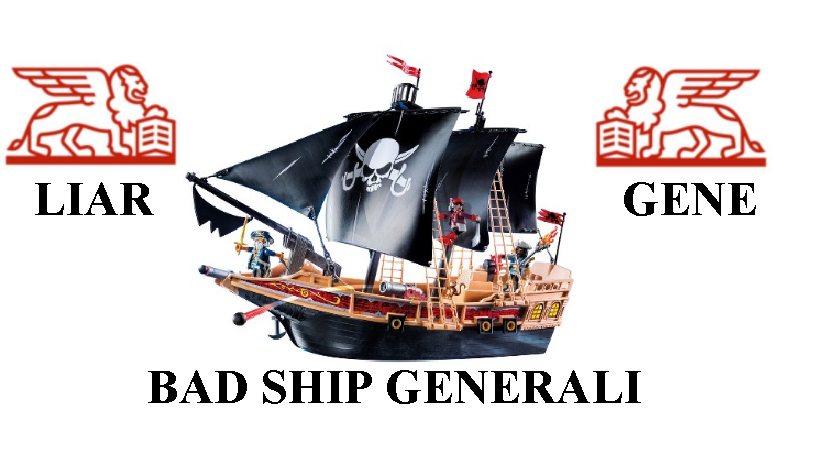
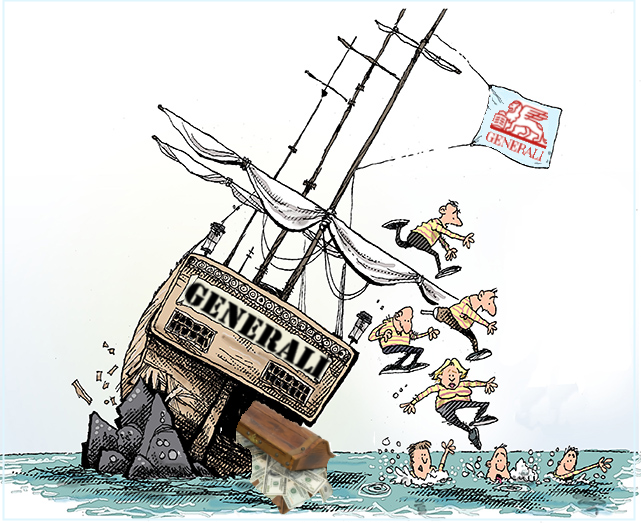
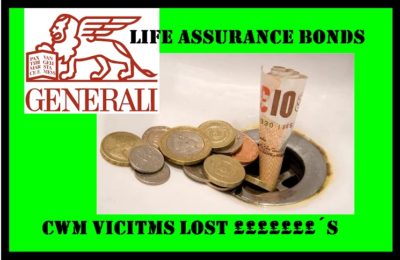
 Please note these figures are correct as at 2017/2018, so today’s value is now even lower. Despite the funds’ huge decrease in value, Generali continues to take their fees (based on the original amount deposited – not the current depleted value). Therefore, these amounts will continue to fall AND despite the massive loses be locked in for a fixed term.
Please note these figures are correct as at 2017/2018, so today’s value is now even lower. Despite the funds’ huge decrease in value, Generali continues to take their fees (based on the original amount deposited – not the current depleted value). Therefore, these amounts will continue to fall AND despite the massive loses be locked in for a fixed term.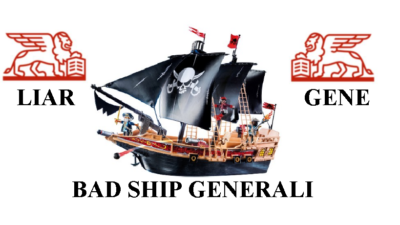 Generali are not the only life office guilty of financial crimes: Old Mutual International and SEB were even worse – facilitating losses on a massive scale in the Continental Wealth Management case. OMI bought £94,000,000 worth of ultra-high-risk structured notes for retail investors – resulting in huge losses. Old Mutual was also heavily involved in more than £1,000,000,000 worth of losses in the Axiom, LM and Premier investment scams.
Generali are not the only life office guilty of financial crimes: Old Mutual International and SEB were even worse – facilitating losses on a massive scale in the Continental Wealth Management case. OMI bought £94,000,000 worth of ultra-high-risk structured notes for retail investors – resulting in huge losses. Old Mutual was also heavily involved in more than £1,000,000,000 worth of losses in the Axiom, LM and Premier investment scams.
 The work of the air industry regulators, investigators and safety trainers never ceases with all parties constantly striving to maintain the highest possible standards of performance and safety. And when something goes wrong, everybody swings into action like the A-team, International Rescue and Tom Cruise combined.
The work of the air industry regulators, investigators and safety trainers never ceases with all parties constantly striving to maintain the highest possible standards of performance and safety. And when something goes wrong, everybody swings into action like the A-team, International Rescue and Tom Cruise combined. But Vueling provide people like me (who end up wearing the same orange jumper and purple socks two days in a row) with an easy to use, online complaints and redress facility. It wasn’t Vueling’s fault that my luggage got lost, but they take responsibility for it anyway because it is part of the whole flight “package”.
But Vueling provide people like me (who end up wearing the same orange jumper and purple socks two days in a row) with an easy to use, online complaints and redress facility. It wasn’t Vueling’s fault that my luggage got lost, but they take responsibility for it anyway because it is part of the whole flight “package”.
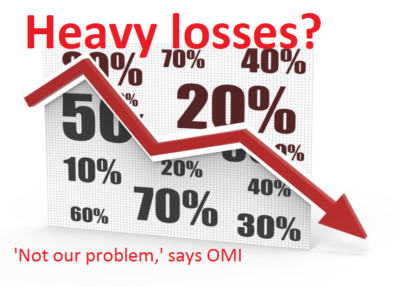
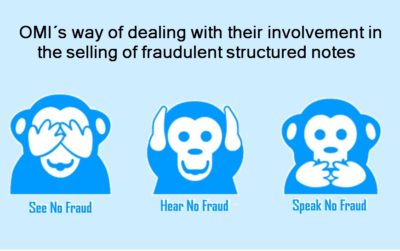
 If I give my car keys to someone who is so drunk they can barely stand up – and certainly can’t spell either OMI or IOM – and there is a serious accident, whose fault is it? The drunk’s or mine?
If I give my car keys to someone who is so drunk they can barely stand up – and certainly can’t spell either OMI or IOM – and there is a serious accident, whose fault is it? The drunk’s or mine?

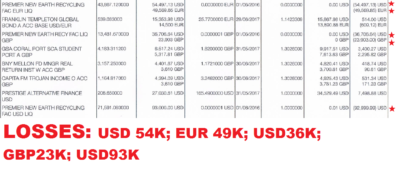 1. New Earth Solutions Group Limited (“NESGL”)
1. New Earth Solutions Group Limited (“NESGL”) Deloittes have made the usual “we are limited in what information we can share so that we do not prejudice any potential claims” disclaimer to the distressed shareholders. But I find it worrying that Deloittes is being used at all for this job. Deloittes was used to inspect the books and records of
Deloittes have made the usual “we are limited in what information we can share so that we do not prejudice any potential claims” disclaimer to the distressed shareholders. But I find it worrying that Deloittes is being used at all for this job. Deloittes was used to inspect the books and records of  However noble, environmentally friendly and ethical the concept of turning rubbish into clean energy may sound in theory, this commercial venture was never commercially viable. In fact, looking at the ever-increasing gross losses from 2008 to 2014: from £0.3m in 2008 to £7m in 2014 – and a total spent on “admin costs” of £14.3m – any half-decent accountant or auditor would have blown the whistle long before 2016.
However noble, environmentally friendly and ethical the concept of turning rubbish into clean energy may sound in theory, this commercial venture was never commercially viable. In fact, looking at the ever-increasing gross losses from 2008 to 2014: from £0.3m in 2008 to £7m in 2014 – and a total spent on “admin costs” of £14.3m – any half-decent accountant or auditor would have blown the whistle long before 2016. The name “Premier” will, of course, strike a chord with victims of
The name “Premier” will, of course, strike a chord with victims of  And, of course,
And, of course,